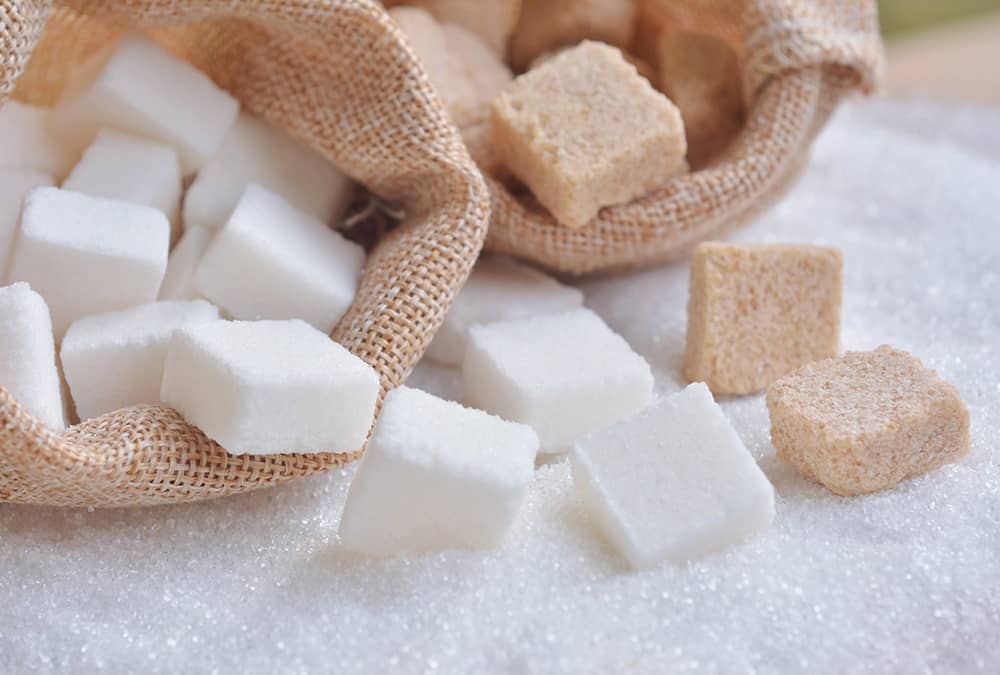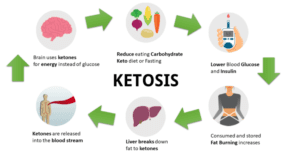Keto dieters need a little sweetness in their lives! Since white sugar is just pure carbs, you have to skip all the standard sweeteners on Keto (even honey, maple syrup, coconut sugar, and agave are out). And as a consequence, many people use sugar alcohols (which are low-calorie sweeteners) instead to satisfy their sweet tooth. Don’t worry, they’re not the same as the alcohol you drink! Chemically speaking, sugar alcohols are sugar molecules with an alcohol group connected to them. Additionally, for people on keto, alcohol is likely to kick them out of ketosis. In the following paragraphs, we’ll go through all the common queries you might have: what are sugar alcohols, common sugar alcohols, are sugar alcohols keto-friendly or not?
What are Sugar Alcohols?
Sugar alcohol is a sugar alternative that has fewer calories and won’t spike blood sugar levels.
Also known as polyols, these sugar replacements are widely used in the food industry to lower the amount of added sugar in low-carb or low-sugar products.
Sugar alcohol is a bit of a misnomer — they are neither sugar nor alcohol, but a combination that creates a whole new type of carbohydrate compound. They also don’t contain ethanol — the chemical in boozy drinks that gives you a buzz.
Sugar alcohols occur naturally in some fruit and vegetables, but the majority are man-made from starch, glucose, and sucrose. They are a bit less sweet than sugar and often form a cooling effect in your mouth.
Do Sugar Alcohols Raise Your Blood Glucose?
Eating a sugar-rich meal will trigger a large glycemic response — aka, sugar in your bloodstream, eating a meal low in sugar and higher in fat and protein will trigger a much smaller glycemic response, less sugar in the blood.
The more blood sugar present, the more insulin you need. Its job is to shuttle that sugar out of your blood and into energy-hungry cells.
If you’re on a low-carb diet or are avoiding sugar because you have diabetes, the main benefit of a low-carb diet is controlling the amount of sugar in your blood and keeping insulin response as low as possible.
How do sugar alcohols work in your body?
Unlike sugar and sugar-based sweeteners, sugar alcohols are not entirely absorbed by your body.
When sugar alcohols contact your small intestine, instead of being rapidly soaked and entering circulation, they’re only partly absorbed — and very slowly. The remaining unabsorbed sugar alcohol moves onto your large intestine, never making it into your bloodstream. While sorbitol is the most likely absorbed, erythritol has the lowest absorption rate. Overall, sugar alcohols produce a lower glucose response than fructose, sucrose, or glucose (the most common nutritive forms of sugar).
However, there’s still debate as to whether the number of sugar alcohols used will actually give you a net decrease in calories or not. This is especially dependent on the type of sugar alcohol.
Note: Low-glycemic is thought to be anything less than 55.
Most Common Sugar Alcohols
-
Erythritol-
Erythritol is a sugar alcohol, but in many ways, it’s quite distinct from the other sweeteners we’ve already mentioned. For starters, its calories are nearly non-existent, with less than 0.3 calories per gram. Despite this low-calorie count, it’s still about 70% as sweet as normal sugar. Unlike other sugar alcohols, which pass through the digestive system but are only partially or not at all absorbed, erythritol passes directly into the bloodstream before reaching the digestive system. It’s then passed through urine. For this reason, it has no effect on blood sugar levels. This makes erythritol an ideal sweetener for people like diabetics and keto followers who are looking to control their body’s glycemic response. Erythritol comes in a white granular form and can be used nearly anywhere you’d use regular sugar.
-
Isomalt-
Isomalt is about half as sweet as table sugar but has little to no effect on blood glucose levels, with a glycemic index of 2. It contains about 2 calories per gram. Unlike other sugar replacements, isomalt doesn’t break down or lose its sweetness when warmed. It doesn’t soak much water, so it’s often utilized in solid products like hard candies and cough drops. Bakers and pastry chefs love isomalt because it controls nearly all of the physical properties of sugar that are appealing when baking, like the ability to resist crystallization and clumping under humidity.
-
Maltitol-
With 2.1 calories per gram and 75% of the sweetness of sucrose, maltitol is widely utilized in hard candies, and can also be found in chewing gum, chocolate, ice cream, and baked goods. Of all the sugar alcohols, maltitol has the most potential to cause a blood glucose response.
-
Mannitol
– Mannitol has 1.6 calories per gram and has 50-70% of the sweetness of sucrose. It is an ingredient you can use for chocolate-flavored coatings found in ice cream and other confections. It’s poorly reabsorbed by the kidneys so it may have a diuretic impact.
-
Sorbitol-
Sorbitol appears naturally in many fruits and vegetables, including apples and berries. Its manufacturing is the basis of corn syrup. Sorbitol is about 60% as sweet as table sugar and has about 2.6 calories per gram (about 30% less than sugar). You can utilize Sorbitol in candies, gums, baked goods, and frozen desserts. It has a glycemic index of 4.
-
Xylitol-
Xylitol is naturally seen in corn cobs, fruit, vegetables, mushrooms, and some cereals. It’s as sweet as sugar but has about 40% of the calories (2.4 calories per gram to sugar’s 4 calories per gram). Xylitol has a glycemic index of 7 and about 4 grams of total carbohydrates per teaspoon. You can find xylitol in chewing gum, sugar-free candies, mints, and oral care products like toothpaste. You can buy it off the shelf in a crystalline form similar to sugar, which is a good choice for sprinkling into smoothies or mixing with coffee. Pet owners should note that while this sugar alcohol is perfectly safe for humans, it can be harmful to dogs even in small amounts.
The Glycemic Index Of Sugar Alcohols
Your body breaks down sugar when you ingest it into smaller molecules. Following their absorption into your bloodstream, these chemicals raise your blood sugar levels.
The body, however, is unable to completely break down and absorb glucose from sugar alcohols. They thus result in a significantly lesser increase in blood sugar levels.
The glycemic index (GI) of these sweeteners, which is a gauge of how quickly meals can boost blood sugar levels, can be used to compare the impact of these sweeteners.
The GI values of popular sugar alcohols are listed below:
- Erythritol: 0
- Isomalt: 2
- Maltitol: 35–52
- Sorbitol: 9
- Xylitol: 7–13
Overall, the majority of sugar alcohols barely affect your blood sugar levels. White table sugar (sucrose), in contrast, has a glycemic index of 65.
Sugar alcohols raise your blood sugar levels less dramatically than sugar since your body can’t completely break them down.
Are Sugar Alcohols Keto-Friendly?
The answer is “it depends”.
Erythritol is one sugar alcohol that doesn’t seem to spike blood sugar and is also pretty effortless on digestion. Keeping blood sugar stable is important for a keto diet, but you shouldn’t neglect food quality and the long-term possible effects of things like sugar and alcohol.
Although some sugar alcohols won’t necessarily impact your blood sugar, there are still too many unknowns to determine whether or not they are part of a nutritious keto diet. They don’t contain important nutrients and may start undesirable digestive issues. More research is required when it comes to the long-term effects of consistently high doses. But this doesn’t mean you can’t enjoy some sugar alternates now and then. In fact, keeping your keto diet exciting is vital to maintaining keto in the long term. Consuming large amounts of sugar alcohols may cause digestive side effects so make sure you choose the correct one for you. Opting for tried-and-true sugar substitutes like stevia and monk fruit is a safe and equally delicious bet.
Takeaway-
Sugar alcohols are low-calorie sweeteners that typically have little to no effect on your blood sugar levels. As a result, they’re a popular keto-friendly choice for sweetening foods and beverages. Just keep in mind that some may be better options than others. The next time you’re looking to add sweetener to your coffee or make homemade keto-friendly sweets and bars, try utilizing sugar alcohol like erythritol or xylitol. Just be sure to consume these sweeteners in moderation to avoid any possible digestive problems.
FAQ’s
1. Which the best sugar alcohol for keto?
Ans: Erythritol
2. Do Sugar Alcohol kicks you out of Ketosis?
Ans: Not all of them. It depends on the type of sugar alcohol you take.
3. Any sugar-free substitutes to use on the keto diet?
Ans: Yes, you can have stevia and monk fruit as low-carb keto sweeteners.
4. Are Sugar Alcohols Keto-friendly?
Ans: The answer to your questions depends on what option you choose and make sure you take it in moderation.
To lose weight, transform yourself into a healthier version, and maintain weight, subscribe to Keto India for a personalized keto consultation. Good luck on your weight loss journey! Stay tuned for more such health content! Also, don’t forget to follow us on Instagram for the daily dose of Ketogenic Diet, Health, and Wellness!








